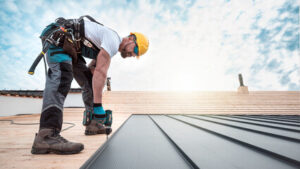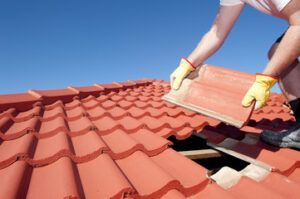Roofers In Columbus GA are tradespeople who specialize in roof construction. They replace, repair, and install the roofs of buildings using a wide range of materials, including shingles and metal.

They are skilled in interpreting architectural drawings and ensuring the work meets building codes. They also inspect and repair existing roofs and damp-proof walls to protect them from water damage.
Roofers work all year round. They might take a break in the winter, but they are not laid off as a result. In fact, they might complete training during this time. It is important for roofers to learn new skills and be kept up-to-date on safety regulations throughout the year.
A storm chaser is a roofer who is insurance-focused. They will come into your neighborhood after a storm and offer to help you with the insurance process. They typically have long sales presentations and might even offer zero-percent financing. However, they are not focused on the customer experience. This type of roofer usually has several crews and is able to get the job done quickly.
They’re Insured
Roofers are exposed to dangers on a daily basis, and even though they’re typically careful, accidents can happen. Because of this, many homeowners prefer to work with contractors that are insured and bonded. This will help protect them in case of an accident, and it also shows that the contractor is serious about their business and committed to following strict state guidelines.
Roofer insurance is a unique type of insurance that offers several benefits. First and foremost, it’s often required by law in most states. Workers’ compensation insurance will help cover medical bills, lost wages, and any disability payments that may be needed. Roofers also need general liability insurance, which will help pay for any damage that may occur during the project. This is often obtained through the excess and surplus (E&S) market, and premiums might be higher than those offered by standard insurers.
In addition, all roofers should have commercial auto insurance, which will help protect their work vehicle from accidents or theft. Generally, personal auto policies will not provide coverage for work vehicles, so it’s important that all roofers have this type of insurance in place. Lastly, all roofing contractors should have surety bonds, which are used to guarantee that the contract will be completed and payment will be made to the proper party.
They Have Better Materials
Roofers have access to better materials than other types of roofers, which means they’re able to provide clients with higher-quality workmanship and products. They also use a variety of tools when working on projects, including roofing shovels and pry bars to remove old roofing systems, power fastening machines and drills, pavers, hammers, ladders, tape measures, chalk lines, and framing squares to install new roofs. Additionally, they may also waterproof concrete and stone walls to protect them from water damage by removing rough spots and brushing or spraying on waterproofing compounds. They also use vapor barriers to create a more insulated, watertight space.
They Have High-Quality Insurance Policies and Warranties
Roofers repair and install the roofs of homes, multi-unit housing complexes, and commercial buildings. Their work helps keep water from leaking into the building and damaging the inside, furniture, equipment, and materials. They also protect stone and concrete walls from the effects of water damage by brushing or spraying on waterproofing compound.
Homeowners typically prefer to work with roofers who have general liability insurance. If a worker falls off a roof and is injured, this type of insurance will help cover their medical expenses and lost wages. It can also help pay for the cost to replace any damaged items. This is important because if a roofer doesn’t have general liability insurance, homeowners may need to tap into their own insurance or pay out of pocket for the repairs.
In addition to general liability, many roofing companies will also carry workers’ compensation. This is because if an employee is hurt while working, it can be extremely expensive for the business to pay for their medical expenses and lost wages. If a roofer doesn’t have workers’ compensation, an injured employee could sue the company for significant damages.
Workers’ comp will also help cover the cost of any legal fees associated with a lawsuit brought against the roofing company by an injured worker. In addition to workers’ compensation, many roofing companies will also carry commercial auto insurance. This type of insurance will cover any vehicles that are used for business purposes like pick-ups and deliveries. It’s important that any vehicles that are used for business purposes have this type of coverage because personal auto insurance won’t provide adequate protection.
Another type of roofing company that has a lot of potential is the storm chaser. These are roofers who specialize in helping homeowners through the insurance process and often work with multiple insurers. Because they are focused on insurance claims, they usually have a lower price point and offer zero-percent financing. While this type of roofer has its benefits, homeowners should be aware that they will likely have to wait longer for their new roof because these contractors are usually very busy during the peak season after a major storm.

